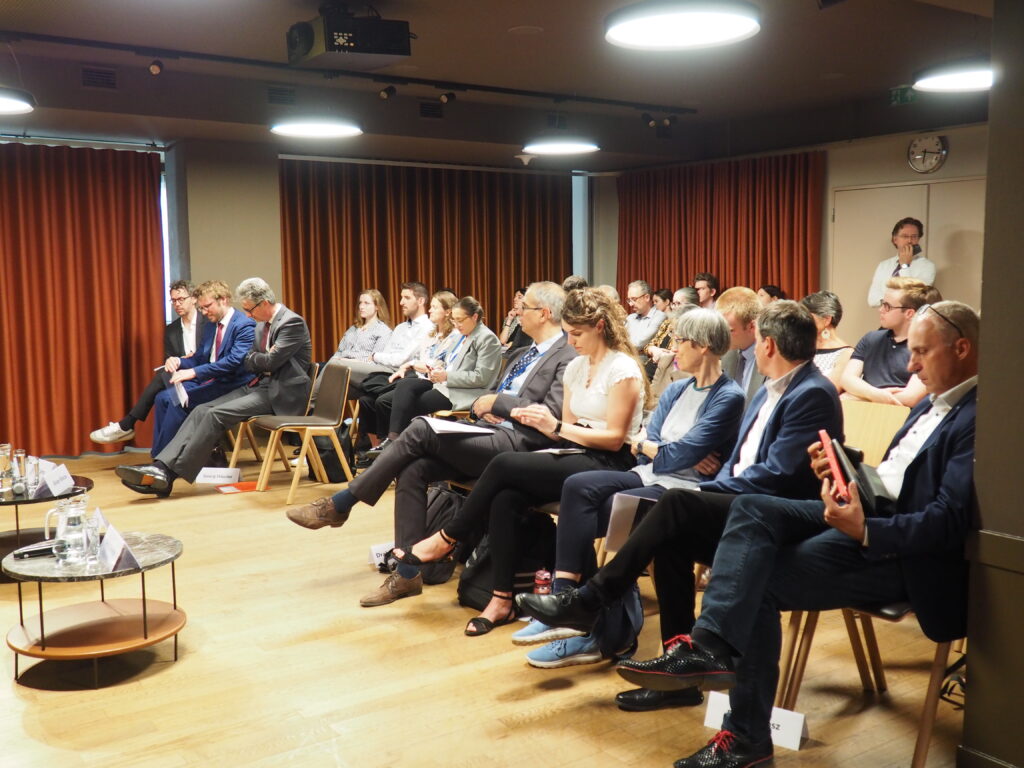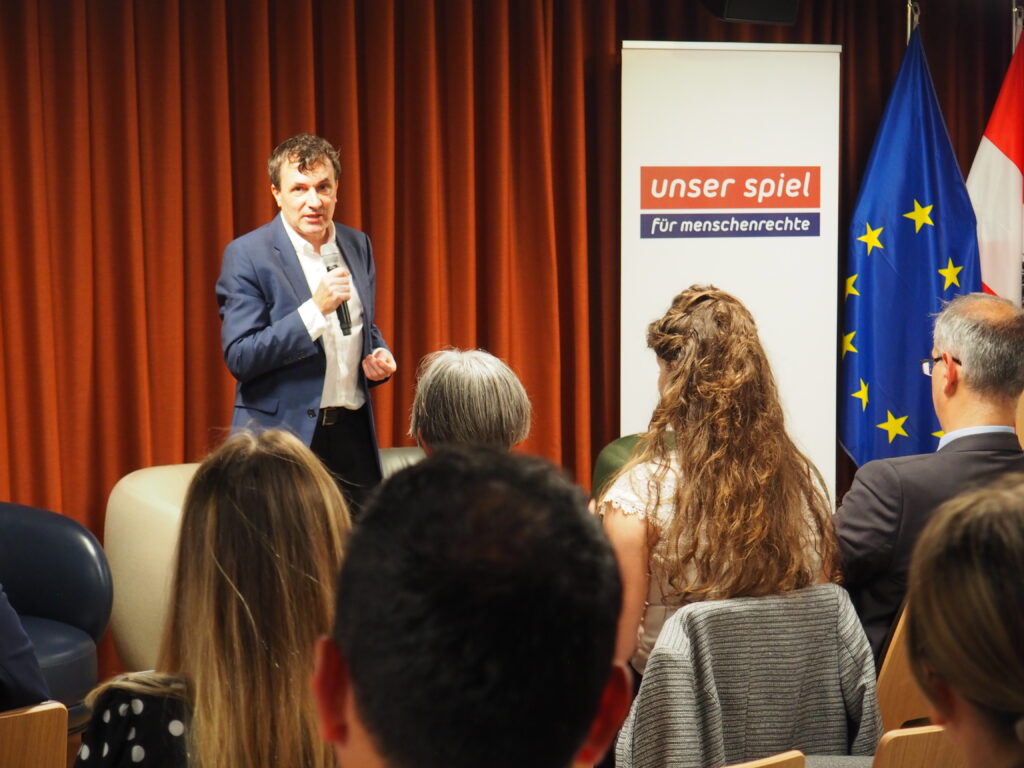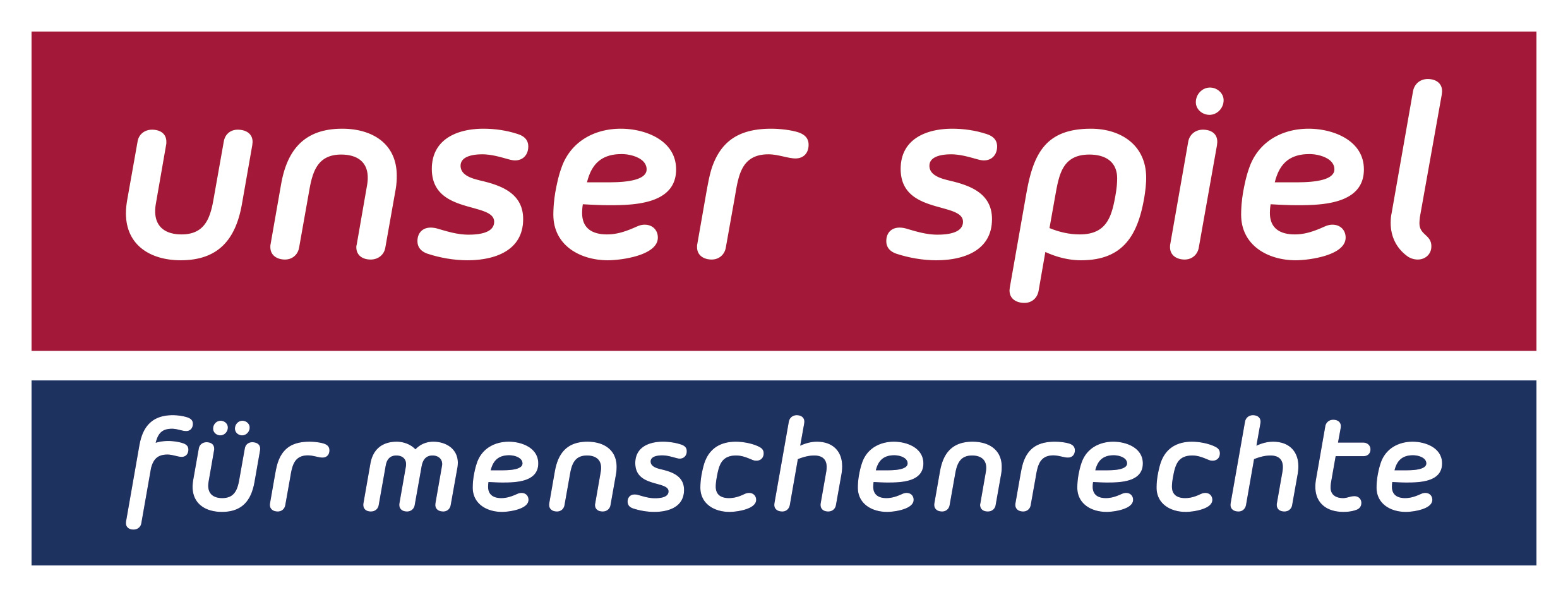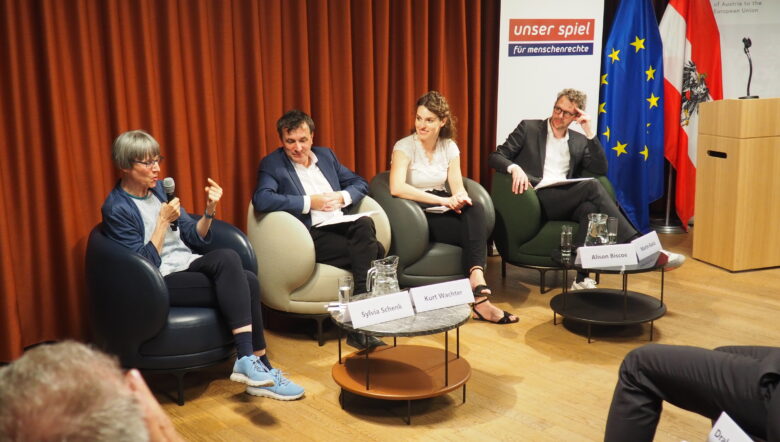A public panel discussion on human rights violations at major international sporting events took place at the Permanent Representation of Austria to the EU in Brussels.
For many, last year’s 2022 FIFA World Cup was one of the most controversial sporting events in history. Following allegations of corruption when Qatar won the bid to host the World Cup in 2010, the country was heavily criticized for exploiting migrant workers, including domestic workers, discriminating against LGBTIQ people by law and restricting freedom of speech.
Almost six months after the final whistle, a public panel discussion was held on May 31, 2023 at the Permanent Representation of Austria to the EU in Brussels to discuss the burning issue of human rights violations at major international sporting events and possible solutions. The aim was to encourage a transfer of knowledge as well as targeted and joint further action.
Nikolaus Marschik, Permanent Representative of Austria to the EU, welcomed the more than 60 participants, who were made up of representatives from member states and civil society. The ambassador said:
“It’s about strengthening the link between Europe, human rights and sport. One of the EU’s objectives is to promote the European aspect of sport and to emphasize fairness and openness. In the field of sport, inclusive efforts can have a profound impact on the fight against racism and discrimination. Following the European Year of Youth 2022, special attention can be paid to the youth sector and sports events and competitions.”

Drahoslav Stefanek, Chair of the Working Group on Human Rights (COHOM) of the European External Action Service (EEAS), reiterated that “human rights, the right to life, are the most valuable thing“. He said that the EU sports ministers, led by Finland, sent a letter to the Commission in January 2021 calling on the EU to “promote human rights in sport and major sporting events inside and outside the EU“.
Georg Häusler, Director for Culture, Creativity and Sport at the European Commission, contextualized the challenges in the field of human rights and sport with retrospective insights. He affirmed: “Playing sport is a human right, sport and human rights are intertwined, and Article 10 of the European Sports Charter affirms sport as a fundamental human right, so there is a direct link between the two.”
Panel discussion – Responsibilities and lessons learned from Qatar 2022
This was followed by a lively panel discussion chaired by Kurt Wachter (VIDC-fairplay), in which the legacy of the World Cup in Qatar, the future awarding of major sporting events and the participation of Russian and Belarusian athletes in the Olympic and Paralympic Games in Paris were discussed.
Sylvia Schenk, member of the IOC Human Rights Advisory Commission and former Olympian, was a FIFA Human Rights Volunteer at the World Cup in Qatar. She said:
“When I traveled to Qatar, I was afraid that I would be disappointed. Especially in Germany, I had the feeling that there was only black and white. Since I have been involved in human rights for 12 years and because I come from a sporting background, I have learned that it is a very complex issue where there is never just black and white.
There are many steps in between if you want to move forward, you can’t just follow your feelings. You can’t just follow some moral compass, you need rights, you need a legal point of view and you need a political point of view. And you have to see what the first step is and what could come after that. Qatar has a lot of problems with human rights, but other countries have problems too.”

Alison Biscoe, Head of Partnerships and Program Development at the Center for Sport and Human Rights (CSHR), was involved in the creation of the center in Geneva in 2018, a multi-stakeholder initiative. She said:
“In the last five years, one of the biggest changes has been that people have realized that human rights are also an issue in sport, and ironically the World Cup in Qatar has contributed to that.
Sylvia pointed out that Qatar is far from the only event where human rights issues are at stake. At the Center, we have tried to develop an ecosystem approach. Each of the different actors, whether governments, sports federations, companies or whoever, has different roles and responsibilities. But it’s about who is at the center of this ecosystem, namely the people who are potentially harmed. These can be athletes, but also local communities hosting events, workers, journalists, fans, officials or coaches – they can all be harmed or negatively impacted by sport, but also positively.
One important development was the inclusion of human rights in the bidding requirements. Next year, 2024, we will see the Olympic Games in Paris and also the UEFA EURO in Germany, and both events will be the first time that human rights will be implemented in the respective events.”
When asked about the transfer of the international discourse on human rights in sport to the national level and what national sports stakeholders can do to promote fundamental rights, Martin Kainz, author of the handbook “International Sporting Events and Human Rights – A Handbook for Implementation in Austria”, said:
“In Austria, the push for human rights at major sporting events started around 2013, when civil society organizations advocated for human rights to be respected, especially during the 2014 FIFA World Cup and the 2016 Rio Olympics. These events drew attention to human rights violations and raised awareness of the responsibility of international sports organizations. In cooperation with the Austrian Ministry of Sport, we formed a working group on sport and human rights.
The aim of this group was to address national human rights concerns and strengthen the influence of Austrian sports federations in international federations. The group, which initially began with six major federations, focused on raising awareness, forming opinions and supporting the representation of interests in these bodies. The group, which now includes 20 organizations, deals with a wide range of issues, from dealing with athletes from Russia and Belarus to women’s rights in Iran and advocating for imprisoned athletes. It also deals with national issues such as the promotion of gender equality, the protection of children and environmentally friendly procurement practices.”
Upcoming mega sporting events: UEFA EURO 20024 and FIFA World Cup 2026
The discussion then turned to the upcoming mega sporting events and what will be different from Qatar 2022. Kurt Wachter asked Sylvia Schenk about the upcoming human rights strategy for UEFA EURO 2024 in Germany, as she played a key role in its development.
“I look forward to sharing with you what is planned for next year, although we are only making incremental progress. We initiated a stakeholder movement in 2016 after the Sport and Rights Alliance lobbied UEFA to include human rights criteria in the EURO 2024 bids. At national level, I worked with civil society, soccer fans and organizations such as Human Rights Watch and came across the need to bridge the gap between the human rights discourse and public perception in Germany – a challenge I still face today.”
With regard to the preparations for the next FIFA World Cup in 2026, Alison Biscoe (CSHR) explained:
“A crucial step is to embed human rights at the bidding stage, which requires a risk assessment by the bidding countries and the potential host cities. This unique approach resulted in individual human rights plans for each host city that took into account the different laws in the US and Canada. The assessments identified strengths and gaps and made city-specific recommendations, particularly focused on children’s rights and engagement – a novel and proactive initiative for event preparation.”
Regarding the key issue of responsibility for respecting human rights, Martin Kainz affirmed.
“The major international sports organizations bear responsibility for serious problems such as the controversies at FIFA. When awarding events based on the bid amount, preference should be given to countries with a better human rights record. Every country should have the chance to bid, but the focus must be on nations that already have an excellent human rights record. However, future events in countries with significant human rights problems, such as Saudi Arabia, raise the question of how they will deal with issues such as the exploitation of workers or gender equality in sport. The trend of awarding events to rich bidders without regard to the human rights situation urgently needs to be reconsidered.”
Autonomy of sport and controversy surrounding Russian and Belarusian athletes
After the contributions on the podium, the discussion was opened up to the audience. Questions were immediately raised about the autonomy of the sports movement vis-à-vis governments and the question of whether Russian and Belarusian athletes should take part in the Olympic and Paralympic Games in Paris 2024.
Sylvia Schenk, who took part in the 1972 Olympic Games in Munich for the Federal Republic of Germany, emphasized the importance of international cooperation and the involvement of all parties. Considering the geopolitical complexity, she pointed out the challenge for the IOC to balance different opinions on the participation of Russian and Belarusian athletes. Referring to historical debates about the Olympic boycott, namely Moscow 1980, Sylvia Schenk warned against outside interference and spoke out in favor of the role of sport in strengthening civil society. She spoke out against state interference in international sporting events and emphasized the need to allow situations to develop naturally.
In a critical statement on the participation of Russian and Belarusian athletes in Paris 2024, Martin Kainz expressed doubts about the clarity of sports autonomy. Although he acknowledged its advantages, he emphasized that sports autonomy must be in line with human rights. Kainz argued that states and EU members are obliged to intervene in cases of human rights violations and stressed that both national and international organizations must respect and protect human rights. He pointed out the complexities, particularly in the context of Russia’s actions, which suggest that athletes’ rights could be violated by restricting their participation. Kainz mentioned recent proposals to allow certain athletes who do not actively support the war or are contracted by the military to compete in the Olympics – but not the Russian flag.
Alison Biscoe also questions the autonomy of sport in human rights violations, she said:
“Autonomy does not exempt from accountability, especially in the context of human rights. The basic principle is ‘do no harm’, which complicates decisions about Russian and Belarusian athletes. Requirements such as rejection of the war can expose athletes to pressure from the regime. The key for the IOC and international federations should be to ensure that Russian, Ukrainian or other athletes are not harmed by the policies they pursue. And it’s not just about governments getting involved; real accountability involves managing this complexity.”
Summary: How can the sport and human rights agenda be taken forward?
The public event in Brussels brought together more than 60 public and civil society stakeholders as well as representatives of EU Member States to exchange views on the promotion of human rights in the context of major sporting events, identify best practices and consider possible next steps following the controversial FIFA World Cup in Qatar.
The panel discussion itself was characterized by the high-profile panelists and their different perspectives. It shed light on various aspects of human rights, with a focus on discussing the responsibility of different institutional actors to create regulations and frameworks that promote human rights monitoring and enforcement, as well as exploring possible ways to make sporting events sustainable and human rights-oriented. In this way, the event helped to raise awareness of human rights issues in connection with international sporting events and to discuss possible solutions among political actors.
“I always learn something new when discussing the complex topic of human rights, and the international exchange at the Permanent Representation of Austria was very exciting,” said Sylvia Schenk, reflecting on the event.
The event was organized by the fairplay initiative at the Vienna Institute for International Dialogue and Cooperation (VIDC) as part of the Our Game for Human Rights project with the support of the Austrian Development Agency (ADA) and the Austrian Ministry of Sport (BMKÖS), which was represented by Head of Department Dieter Brosz.
Special thanks are due to the Permanent Representation of Austria to the EU, in particular Ambassador Nikolaus Marschik, Felix Hauer and Kimberley Baeyens, who hosted the event and provided indispensable support.

